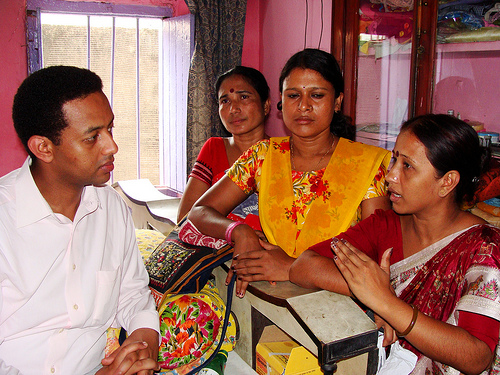
In a study of Commercial Female Sex Workers(CFSWs) of Bowbazar red-light area of Kolkata, it was found that 58% of them came from various oppressed castes originally residing in backward rural areas of West Bengal and Bangladesh driven to the trade by extreme poverty. Eleven percent of these, CFWSs were brought into this trade because their lovers or paramour trapped them with false promises of security. Less than half (42%) reported that they were forced into this trade as a result of the dowry related torture inflicted by husbands and in-laws and also as a means of survival post the breakup of the marital family. Only 2% of the CFSWs were in the trade as second or third generation sex workers.
They welcome motherhood while they are unable to provide complete care and attention to their offspring. They are being forced to relinquish care of their infants. Lack of economic support, insufficient living spaces, the absence of family and neighborly assistance makes it more difficult for them to find alternative sources for child care. Despite all these difficulties, most of the CFSWs does their best to prevent their daughters from entering the trade. So, the notions of the larger society, the mothers push them into the trade for their own benefit to keep their trade cycle alive generation after generation is only a myth. But why these girls were forced into their mothers’ profession.
CFSWs perform dual roles of child care and earner because their family is matrifocal and single headed. As a result of this, the child focuses on the mother figure and bonds that develop are restricted to their mother and/or the female care giver. Their typical socio-cultural milieu is differently constructed gender route through the childhood behaviour and activities. During the middle childhood (7-8 years) girls perform domestic chores in their families ranging from sweeping, fetching water, looking after the younger sibling, shopping to cooking or assisting their mothers in these tasks. During this age, many of the girl children spent three to four hours during the day at education centres run by Non Governmental Organizations(NGOs) in the premises of a local club of their community. Thereafter, many of them got admitted into formal school located at near the community. However, this depended on the financial condition of their mothers as well as the mothers’ educational background and might also be dependent on the educational background of their mothers’ partners. But it was gravitated that 20% of the girls were never attended school. Eighteen percent dropped out from school. Significantly, 10% of these girls were dropped out between their ages of 10-16 years when they were undergoing their high school education. Only 20% of the girls continued their school education. About 15% of the girls left their school to assist their mothers in trade. Another 12% dropped out as a result of having to take on household chores such as cooking, fetching water, sweeping-cleaning, daily shopping and looking after their younger siblings. The peer influenced 8% of them to leave their school. A few ( 8% ) were withdrawn from their school because of their romantic relation. It was observed that there was a trend of being oriented into the trade. The girls were encouraged by their mothers to supply alcohol and other foods to their mothers’ clients so as availing special reward from the particular client. The interest in sex develops at an early stage by observing their mothers’ engagement in the sex trade. When aged CFSWs are generally incapable to attract their clients, they use their teen girls to attract clients. The lack of space and secure shelters for children, especially young girls leads them to mix freely with the male members of their community and also male members from outside the community such as the clients of their mothers. When their mothers are with the clients, these young girls either stay on the terraces and roofs of their houses or in the streets and lanes of the community, often till late in the night. The study showed that the girls either got involved with their peers or developed romantic relations with men. They were precocious and provocative in their interaction with males, and dating and premarital sex was common even to their early teens. They went on trips lasting for two or three days with their partners. Many of them got marriages at young ages(15-16 years). It was found that 75% of them got married the boys of their own community and 27% of them married to the boys had linked to their community. But 88% of their marriage did not give a stable marital or nupital relation.
The single parent is unable to provide appropriate care affecting the social development of the child. As a consequence, the child irrespective of gender suffers physical and emotional crises. Attitude of the mother and her financial condition play a significant role in the education of her children, especially the girls. The lack of education coupled with the absence of a safe shelter for the girls puts them at a greater risk of being forced into the trade. Moreover, it leads them into forming romantic relationships whilst in their early teens, resulting early marriage/underage marriage. The relationship with their spouses and in-laws is affected by their unconventional upbringing and at times the girls are unable to adjust to their new families leading to marital problems. In many cases, financial problems and interferences by the mother causes further marital problems. The experience shows that girls who are provided secure places to grow up in and receive appropriate care and attention whilst growing up is able to make better use of the educational opportunities that come by them. They also demonstrate the capacity to adjust to people from outside the CFSWs’ community and break out of the system which traps, their mother.
Harasankar Adhikari is a Social Worker









































